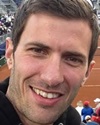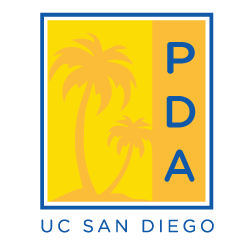
Chris Noakes, Ph.D.
Sales Associate, Pharma/Biotech/Industrial Accounts | VWR International

- Interview Overview
Interview Overview
Interviews by: Anjana Chandrasekhar
Editing: Jamie Joseph
1. Please list your previous department at UC San Diego and provide a brief description of the research you conducted?
I was a postdoctoral scholar in the Department of Cell Biology and Oncology at the School of Medicine. I was responsible for the in vivo and in vitro characterization of novel oncogenes, GOLPH3 and GOLPH3L. I conducted cell-based assays of GOLPH3 overexpression in stably expressing cell lines and determined related effects on oncogenic transformation. I also created a mouse model of inducible GOLPH3 overexpression and characterized model associated tumor pathology.
2. Please describe your current job profile?
I am currently training as a sales associate for VWR, a science distribution company. I assist the account managers for major pharmaceutical accounts in San Diego in various areas including day-to-day business, sales and marketing. I am also responsible for managing smaller accounts in the greater San Diego community – such as at biotech incubators and contract research organizations.
3. What made you decide to transition into your current position?
I had previously attempted to transition into R&D positions within the pharmaceutical/biotech industry with little success (wrong skill set, intense competition). I have always had an entrepreneurial mind and had become tired of the daily grind of bench research. I wanted to develop multiple potential career paths while maintaining and utilizing my extensive hands-on scientific experience.
4. Apart from the research you conducted, do you feel like anything in particular has helped you to acquire your current position?
Communication – During my postdoc, I had to communicate my scientific knowledge and theories to other scientists. This skill has been a great asset and I use it daily in my current position. For example, I have daily conversations with customers to determine their specific scientific needs.
Logical thinking – I was posed with many hypothetical business situations during my job interviews. I also engage in problem solving strategies at my current position on a regular basis.
Time management – As a postdoc, I honed my ability to run multiple experiments simultaneously and plan my work ahead of time. I now leverage this skill to in order organize my schedule and adapt accordingly, as unexpected issues arise consistently.
Other helpful hints – I updated my CV regularly and tailored it to specific job requirements (i.e. sales vs. research based positions). Remember to always include a cover letter. It’s important to maintain a good online presence (e.g. LinkedIn) and attend networking sessions (I went to many SDBN and PDA events). Learn from your interviews. My first interview went terribly. However, I learned from my mistakes and used these experiences to improve upon my subsequent interviews. Specifically, I gained a better understanding of the type of questions I would be asked and how I should respond.
5. Please list some of the most striking similarities and differences between your post-doc and current position?
Similarities:
Scientific understanding - My hands on lab experience is still very useful. I can identify customer’s research areas and even give them advice for research areas I am familiar with.
Set my own schedule - Although weekends are not expected, I work as hard as I want to, when I want to!
Specific expertise - As a sales associate, you need to know your accounts better than anyone else – much like you need gain expertise in your specific research area as a Postdoc.
Differences:
Daily success - You can see your efforts come to fruition more quickly. For example, a customer may decide to purchase items you quoted for them earlier in the day.
Job satisfaction - You get rewarded and praised for doing a good job, it’s not just implied.
Commute - I have a home-based position with local area travel.
6. Is there any specific challenge (during the entire process of transitioning) that you would like to highlight and if so how did you overcome it?
My lack of sales experience was the primary concern. It was a bit like the chicken or the egg – How do I obtain sales experience without already being a sales rep? I overcame this by utilizing some key postdoc skills including extensive hands-on science experience, technical communication ability, time management and self-motivation. These have also become important attributes for my current position.
7. Please describe your goals and ambitions for the next 5 years?
I would like to gain more experience in sales and business. I hope to become a sales rep next year and manage my own territory worth $1million+. If I am able to achieve these goals, I will reassess my options and determine what direction I should pursue – either a more specialized sales role (e.g. life science specialist for VWR, or supplier sales rep) transition into a consultancy, or obtain a continuously expanding medical science liaison position, which seems appealing (these usually require both PhD level technical knowledge and sales experience).
8. What do you feel you could have done more, as a postdoc, to help prepare you for or acquire your current position?
Network, network, network! It’s not what you know, but who you know. I was VERY fortunate to have the chance to interview for my current job. Most interview candidates have first or second degree connections that get their CV/resume to the top of the pile. After being on the other side of the fence and from my discussions with hiring managers in pharma, I realize that it is quite difficult to get jobs in the industry. There are often 100’s of people applying for the same job, and they are either equally or more qualified than you. Many companies avoid advertising positions as they know they will be inundated with applications. Instead, they tend to reach out to friends/colleagues to find prospective candidates. Meet as many people as you can as quickly as you can, and don’t burn any bridges! Go for the shotgun approach!
9. What do you feel is the most important advice you can give to a current UCSD postdoc in order for them to obtain a position such as yours?
Do not give up hope. It took me several months and 100’s of applications and hours spent searching web (For example, I continuously scrolled from A-Z on the San Diego Biotech Network Directory looking for open positions).
Don’t be afraid to apply for positions out of your comfort zone. Even if you don’t consider yourself an optimal fit, you may still stand a chance.
Also, give yourself plenty of time to look for positions before your postdoc ends. You may not walk seamlessly from a postdoc to your next job. Even if you have 2 years left on your fellowship or contract, start planning your future and applying for jobs now.
